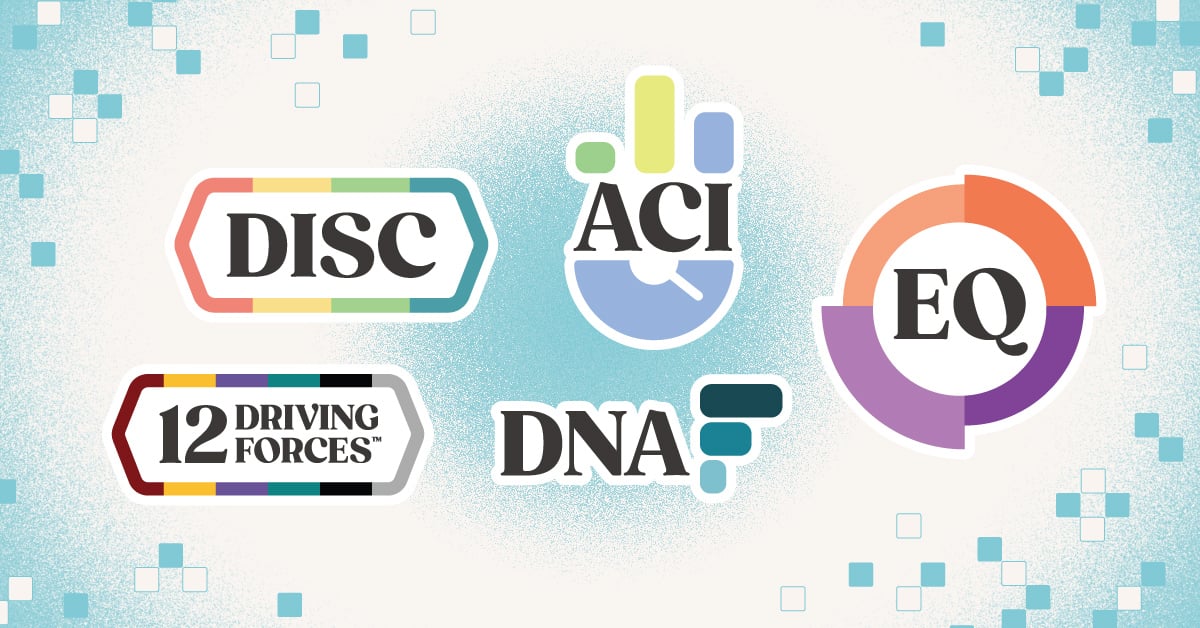
Axiology is a powerful concept and measurement tool, and it’s incredibly effective when used in assessments. However, it can be complicated to understand.
Here’s what you need to know about Axiology in assessments, made simple.
What is Axiology?
Axiology is the philosophical study of value. It measures thinking patterns, or dimensions of thought, and how we value people, tasks, and systems. In TTI Success Insights’ ACI (Acumen Capacity Index) assessment, axiology is used to better understand how clearly we see three dimensions (people, tasks, and systems), from the perspectives of the world-view (external) and self-view (internal).
TTI’s ACI manual states, "Axiology is a mathematically accurate science that objectively identifies how one's mind analyzes and interprets our experiences. It identifies how we are most likely to react in any given situation and helps us understand how we make judgments.”
One of the axiological measurements is a person's clarity level, which equates to their capacity to see people, tasks, and systems. The higher the clarity, the more capacity to understand that dimension—be it people, tasks, or systems.
However, a high clarity score does not necessarily mean that a person will perform accordingly based on their level of understanding in that particular dimension. For example, someone might have a high clarity score when it comes to understanding people, but that does not mean they will interact well with others. The score only identifies that the individual will have a strong capacity to understand how to interact with others; it can’t determine how they will act.
Very simply, Axiology is a measured way to look at how an individual values the world around them.
What is the Framework of Formal Axiology?
There are three primary value dimensions in Axiology:
Systemic Value: The value of things in relation to their contribution to a larger system or context. The Systemic value relates to the role or function of something within a broader framework or structure.
Extrinsic Value: The value of things in relation to their usefulness or utility in achieving desired outcomes or goals. The Extrinsic value relates to the instrumental or practical value of something.
Intrinsic Value: The value of things in themselves, independent of their usefulness or consequences. The Intrinsic value relates to the inherent worth or goodness of something.
For example, consider your house. The Systemic Value of the house would be the blueprint (the literal, functional structure of the house), the Extrinsic Value would be the style of the house (the way it looks, the practical appearance of the house), and the Intrinsic Value would be the personal ownership of the house (you have a personal, emotional connection to the object in question, the house, because it’s your home).
How is Axiology Used in Assessments?
TTI uses Axiology in the ACI assessment, which stands for Acumen Capacity Index.
“Axiology helps understand an individual's thinking patterns. It reveals how you understand and interpret the world around you, as well as your own self-concept or personal view,” said Favor Larson, Director of NextPoints at TTI. “It reveals where you have blind spots or emotional biases that impact your thoughts and decisions. Everyone has biases, and the ACI assessment helps a person understand the ‘lens’ through which they interpret their reality.”
TTI’s assessment is based on the scientific theory of formal axiology, pioneered by Robert S. Hartman, a philosopher, professor, business consultant, writer, activist, economist, ethicist, and mathematician. He was nominated for the Nobel Peace Prize in 1973. His work is continued through the Robert S. Hartman Institute. Hartman called his model the Hartman Value Profile. The institute is composed of volunteers who are theorists and practitioners who have a strong belief in Hartman’s concept of finding meaning in an individual’s value system in order for them to find purpose in their lives.
“The concept of good is fairly universal but can be hard to explain,” said Larson. “If I said, ‘Find my car in this parking lot. It’s the good car,’ you’d likely need more direction to find it. Axiology provides clarity by defining three dimensions through which we interpret information. The ACI assessment helps apply the concepts of axiology to an individual, allowing for more personalized awareness and growth.”
What are the Applications of Axiological Assessments?
The most powerful applications of the axiology assessments are in-depth coaching for personal growth, leadership development, hiring for managers and upper-level positions, and taking high-functioning teams to the next level.
"Axiology helps us understand so much more than behavioral style,” said Suzie Price of Priceless Professional Development. “It tells us about the quality of a person's judgment and decision-making ability. It gauges their mental clarity and emotional orientation. Once you understand what Axiology measures, as a coach, leader, or hiring manager, you never want to be without it.”
An Axiology assessment helps leaders, teams, and entire organizations by identifying core guiding principles, measuring values, and supporting individuals and teams in aligning their goals with their intrinsic values.
Axiology can be used for job placement as it reveals how specific roles would be more suited for people based on their acumen. It’s also excellent in a multi-science strategy of assessment use; measuring how a person thinks in relation to their behavior, motivation, emotional intelligence, and skills has great value.
“I’ve also seen a lot of success with this tool when used to spot overextensions or imbalances in an individual,” said Cassandra Nelson, Facilitator & Curriculum Designer at TTI. “For example, I am Outgoing and naturally optimistic. I also have a high Altruistic driver and love to help others. My competencies are more developed in appreciating others and customer focus, which are people-focused. From this, you would think I trust everyone; however, I score very high in Acumen in Understanding Others, or the capacity to see others clearly, with a mixed bias, which means I trust people based on the situation. It is my only saving grace, primarily because of my behavior and motivation.”
Understanding Axiology in Assessments: Why It Matters
Axiology is an incredibly valuable tool when it comes to understanding how individuals perceive and prioritize the world around them. Understanding axiology and the ACI assessment not only enhances self-awareness; it enables individuals to adapt and expand their perspectives, leading to greater personal and professional fulfillment.
“One of my favorite quotes comes from Oliver Wendell Holmes, Jr.: ‘A mind that is stretched by a new experience can never go back to its old dimensions,’” shared Larson. “I think this is very true for Axiology. Once you learn to recognize Systemic, Extrinsic, and Intrinsic thinking, you see it everywhere.”
If you’re interested in learning more about Axiology, the ACI assessment, and how to harness its potential, join Clay Eure’s session at Forty Forward. You’ll learn how to address all three dimensions in coaching, leading to better outcomes and more balanced client relationships.




